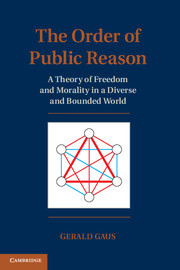Book contents
- Frontmatter
- Contents
- Preface
- I The Fundamental Problem
- PART ONE SOCIAL ORDER AND SOCIAL MORALITY
- PART TWO REAL PUBLIC REASON
- V The Justificatory Problem and the Deliberative Model
- VI The Rights of the Moderns
- VII Moral Equilibrium and Moral Freedom
- VIII The Moral and Political Orders
- Concluding Remarks on Moral Freedom and Moral Theory
- Appendix A The Plurality of Morality
- Appendix B Economic Freedom in States that Best Protect Civil Rights
- Bibliography
- Index
VIII - The Moral and Political Orders
Published online by Cambridge University Press: 03 May 2011
- Frontmatter
- Contents
- Preface
- I The Fundamental Problem
- PART ONE SOCIAL ORDER AND SOCIAL MORALITY
- PART TWO REAL PUBLIC REASON
- V The Justificatory Problem and the Deliberative Model
- VI The Rights of the Moderns
- VII Moral Equilibrium and Moral Freedom
- VIII The Moral and Political Orders
- Concluding Remarks on Moral Freedom and Moral Theory
- Appendix A The Plurality of Morality
- Appendix B Economic Freedom in States that Best Protect Civil Rights
- Bibliography
- Index
Summary
It is a mistake then to think of the state as an aggregation of individuals under a sovereign – equally so whether we suppose the individuals as such, or apart from what they derive from society, to possess natural rights, or suppose them to depend on the sovereign for the possession of rights. A state presupposes other forms of community, with the rights that arise out of them, and only exists as sustaining, securing, and completing them. In order to make a state there must have been families of which the members recognised rights in each other (recognised in each other powers capable of direction by reference to a common good); there must further have been intercourse between families, or between tribes that have grown out of families, of which each in the same sense recognised rights in the other. … That, however, is the beginning, not the end, of the state. When once it has come into being, new rights arise in it and further purposes are served by it.
T. H. Green, Lectures on the Principles of Political ObligationIn the last chapter we saw how a moral equilibrium can arise in a society on some member of the optimal eligible set. Our social morality is the outcome of social processes that lead to the social recognition of rights and duties, which provide the basis of an ordered yet free social life.
- Type
- Chapter
- Information
- The Order of Public ReasonA Theory of Freedom and Morality in a Diverse and Bounded World, pp. 448 - 546Publisher: Cambridge University PressPrint publication year: 2010



